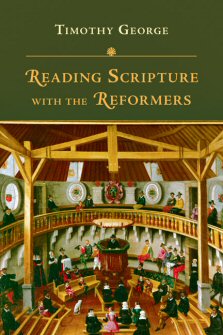Reformation Day is October 31. In remembrance, keep reading to explore with David P. Barshinger how the Reformers offer us a model for Bible study. (Or dig deeper into Reformation exegesis with Reading Scripture with the Reformers or The Martin Luther Collection (42 vols.)
***
Martin Luther (1483–1546), John Calvin (1509–1564), and other Reformers from the sixteenth century are renowned for their renewed emphasis on the Bible. They championed the study of Scripture in the original languages. They went toe-to-toe with leaders of the late medieval Church to defend the Bible’s authority. They elevated God’s word in their churches—both physically in raised pulpits and spiritually in Scripture-saturated sermons and liturgies. The Reformers thus naturally offer a model for Bible study today.
Here’s three ways how.
1. The Reformers treated the Bible as God’s very word.
The Reformers fiercely pointed people to Scripture as divinely inspired. They focused believers appropriately on the word of God as the most reliable source of knowledge about God. In a day when the Church controlled how average people conceived of all things spiritual, the Reformers proclaimed the watchword sola Scriptura; “Scripture alone,” not the church, stands as the ultimate authority. As Calvin put it, Scripture is “a more direct and more certain mark whereby [God] is to be recognized.”1

2. They recognized the value of Bible teachers—even dead ones.
While the Reformers called for sola Scriptura, they rejected the notion of nuda Scriptura, or “bare Scripture.” While continually appealing to the Bible as their ultimate authority, the Reformers also read the works of Bible teachers and cited them in their work. For example, Luther ranked Augustine’s writings as the best after the Bible.2
The Reformers made this appeal in part because they wanted to show that their theology stood in line with the ancient Church. They also did it to show that only Scripture is the norma normans, the “norming norm” or the ultimate norm: believers interpret the Bible within the community of faith, but the Bible keeps all believers in check.
3. And they didn’t see any Bible teacher as infallible.
The Reformers definitely cited earlier theologians, but they also didn’t hesitate to point out places where they disagreed with them. Even Augustine, Luther thought, sometimes failed to stick closely enough to Paul. John Jewel (1522–1571) modeled what Timothy George calls a “critical reverence” toward the Church fathers: “We despise them not, we reverence them, and give thanks unto God for them. . . . Yet may they not be compared with the Word of God. . . . They bear witness to the light, [but] they are not the light.”3
The Reformers’ model for Bible study guides us in how to appropriate the past, disagree with the past, and prioritize Scripture in our Bible study. Why, then, do we not attend more carefully to Bible study from the past?
Timothy George observes that an “imperialism of the present” leads some evangelicals to ignore centuries-old biblical interpretation; and, ironically, some take sola Scriptura as grounds for neglecting the very Reformers who bequeathed the principle to us.4
But if sola Scriptura was never meant to isolate Scripture from the broad, transtemporal community of faith, then we depart from the Reformers when we look down on (or simply ignore) the exegesis of centuries past. For we can benefit from them without jettisoning the legitimate advances that have been made in more recent study of the Bible. As George puts it, “We read the Reformers for the same reason that we pay attention to the Church fathers: . . . We listen to their struggles, musings, and debates about the written Word of God as a way of better attending to the thing itself.”
***
This excerpt was adapted from Bible Study Magazine.
Related articles
- 5 Solas of the Reformation
- Renaissance Humanism: The Tie That Binds the Protestant Reformation
- How Luther Accidentally Sparked the Reformation
- John Wycliffe: The Morning Star of the Reformation
- Does the Protestant Reformation Still Matter? (Interview)
Related resources
- John Calvin, Institutes of the Christian Religion, trans. Ford Lewis Battles, ed. John T. McNeill (Philadelphia: Westminster, 1960), 1.6.1.
- Herman Selderhuis, Martin Luther: A Spiritual Biography (Wheaton, IL: Crossway, 2017), 90.
- Quoted in Timothy George, Reading Scripture with the Reformers (Downers Grove, IL: IVP Academic, 2011), 82.
- George, Reading Scripture, 25.







